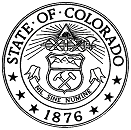![]() The information on this page is archived and provided for reference purposes only. It may be outdated or no longer maintained.
The information on this page is archived and provided for reference purposes only. It may be outdated or no longer maintained.
Congress improving overseas voters’ access to ballots
Colorado already complies with most of the MOVE Act
October 28, 2009 - Last week as part of the National Defense Authorization Act, Congress made significant strides to improve overseas voting. The Military and Overseas Voter Empowerment Act or MOVE – a rider to the Defense Authorization bill – was signed by President Barack Obama on Wednesday.
This legislation will ease restrictions faced by overseas voters, which include members of the armed services protecting American interests around the world. I am proud to say that most of the provisions outlined in the legislation are already in place for Colorado’s overseas voters. In fact, the Overseas Vote Foundation recently named Colorado to its list of the top five states for its military and overseas voting policies.
The bill mandates that states provide for faster access to voter registration forms and mail ballots for those Americans living overseas. The Colorado Secretary of State’s office has pioneered overseas access to voter registration forms, mail ballot applications and even ballots via the internet, email and fax. Currently, overseas voters who are Colorado citizens can return their completed ballots and forms using a fax machine and in exceptional circumstances, can use a so-called “write-in ballot” where voters already know the races and candidates for whom they want to cast their votes before the ballots are even printed.
In addition, the Colorado legislature recently mandated that the counties accept late ballots from service-members serving overseas. Representatives Marsha Looper and David Balmer and Senator Suzanne Williams authored legislation extending the time counties will accept mail ballots from overseas military to eight days after the election. The law also allows the Secretary of State’s office to create a pilot program to allow secure internet voting for overseas military. We are currently pursuing funding and reviewing all available options for this project.
Under the MOVE Act, every state will be required to make these options available to all U.S. citizens living abroad starting in 2010. Although Colorado will easily meet the ballot access requirements of the bill, my office will be forced to seek a waiver to exempt our voters from the 45-day overseas mailing provision. Other states with late primaries, like Washington, will also need a waiver or a change in state law moving back the primary election so as to provide time for overseas voters to receive their ballots. As Washington’s Secretary of State Sam Reed wrote in a letter to Congress, “I strongly support 45 days of transit time for absentee ballots, but urge you to remove the mandate that the entire 45-day period occur before Election Day.”
As a result of Colorado’s August primary and initiative process deadlines, ballots typically are still being finalized 45 days prior to the election. In fact, under state law, the ballots are due to the county clerk 32 days before Election Day. In order to fully comply with this new federal legislation, Colorado will likely need to move its primary date and adjust the entire election calendar. Unfortunately, such a change is impossible before the 2010 election. In preparation for the 2012 election, however, I will work with members of the Colorado House and Senate to craft appropriate legislation.
Colorado’s county clerk and recorders work closely with their overseas military voters and others to ensure that each has access to the materials they need to cast their ballots on time. My aim is to ensure that all overseas voters, whether they are a doctor in Kenya or a combat marine in a forward operating base, has the same opportunity to vote as those citizens living in the state of Colorado. The Secretary of State’s office will continue to work toward that goal.
Bernie Buescher
Colorado Secretary of State




 Menu
Menu  Search
Search 
